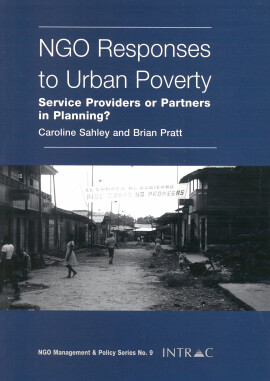
NGO Responses to Urban Poverty
Service Providers or Partners in Planning?
If urban development is to move forward in a pro-poor manner, there will have to be far greater investment in NGOs, to enable them to work with and on behalf of the poor. If this is not done, then there is a danger that they will remain, in some cases, simply providers of welfare services or involved in isolated small-scale initiatives with little wider impact. Detailed case studies of urban NGOs in Bangladesh, Ethiopia, India, Peru and South Africa illuminate the critical factors necessary for effective NGO performance in the city and define a capacity building agenda for NGOs to realise this potential in urban poverty alleviation.
Examples in this study that show the potential for a future where NGOs operate as both technically proficient urban development agencies and credible advocates for the poor. It is to these and other agencies like them across the world that we should be looking for our future inspiration.
Published: 2003
Pages: 144
Paperback: 9781897748473
Examples in this study that show the potential for a future where NGOs operate as both technically proficient urban development agencies and credible advocates for the poor. It is to these and other agencies like them across the world that we should be looking for our future inspiration.
Brian Pratt
Brian Pratt is one of the founding members of INTRAC and is the Executive Director. He has worked in many countries as a consultant and researcher for NGOs, and multi- and bilateral agencies. The primary focus of his publications and consultancies is on strategic policy issues for NGOs and Monitoring and Evaluation (M&E).





